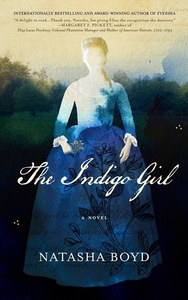Take a photo of a barcode or cover
adventurous
emotional
informative
inspiring
sad
tense
fast-paced
Plot or Character Driven:
Character
Strong character development:
Yes
Loveable characters:
Yes
Diverse cast of characters:
Yes
Flaws of characters a main focus:
Yes
It’s really sad that someone at the Charleston Visitor Center read this overtly racist book and thought it would be a good choice to put on the sales floor. This book is an utterly tone deaf portrayal of a “good” slave master, full of revisionist history and the romanticization of slavery. As for the female empowerment narrative the author was trying to drive home, it’s hardly something to be celebrated when it’s clear Eliza only gained that power by stepping on the backs of the humans she enslaved.
Graphic: Slavery
medium-paced
The last time I was in Charleston, SC, one or two tours that I went on mentioned Eliza Lucas. Her father left her in charge of his plantations near Charleston in the 1740s while he went to war with the Spanish in the Caribbean. That really caught my attention. A woman running plantations? At that time? And she was only in her teens? I wanted to know more.
I stumbled on The Indigo Girl while I was browsing Main Street Reads in Summerville, SC. That gorgeous cover grabbed my attention first. I couldn't resist it. Then I realized that it was about the same woman I'd heard mentioned on my tours. I was sold.
The Eliza I found in these pages was delightful. She's obviously a nonconformist, smart, stubborn, and caring. I loved seeing her grow more confident in herself and her abilities despite society's low-to-nonexistent expectations of women. She's exactly the kind of real-life person I love to read about--a woman who's almost been lost to time despite her historical contributions. I'm thankful to authors who search out these kinds of stories and share them with us.
There is one subplot that seemed just too inconceivable for a woman of her time and station and I had a hard time accepting it and moving on with the story. I would occasionally get jerked out of the tale and ask myself, "Do I buy this?" And the answer was no. But she was an individualist in many ways, so who knows? The author writes in her Afterword that she pieced together two tiny pieces of Eliza's extant letters and invented this part. It was very distracting to me and even seemed unnecessary.
Ms. Boyd writes in her author's note that Margaret Pickett published a biography of Eliza after she (Ms. Boyd) finished writing her historical fiction book. I'd like to know more of the factual story, so I'll be looking for it.
This is a small thing but, aside from that beautiful cover, this book is just such a physically nice edition. It is a paperback but the pages are thick and cream-colored and it's easy to hold open. I love books that just feel nice to hold.
If you like reading about historical women who break the mold that's been cast for them, give this a try.
I stumbled on The Indigo Girl while I was browsing Main Street Reads in Summerville, SC. That gorgeous cover grabbed my attention first. I couldn't resist it. Then I realized that it was about the same woman I'd heard mentioned on my tours. I was sold.
The Eliza I found in these pages was delightful. She's obviously a nonconformist, smart, stubborn, and caring. I loved seeing her grow more confident in herself and her abilities despite society's low-to-nonexistent expectations of women. She's exactly the kind of real-life person I love to read about--a woman who's almost been lost to time despite her historical contributions. I'm thankful to authors who search out these kinds of stories and share them with us.
There is one subplot that seemed just too inconceivable for a woman of her time and station and I had a hard time accepting it and moving on with the story. I would occasionally get jerked out of the tale and ask myself, "Do I buy this?" And the answer was no. But she was an individualist in many ways, so who knows? The author writes in her Afterword that she pieced together two tiny pieces of Eliza's extant letters and invented this part. It was very distracting to me and even seemed unnecessary.
Ms. Boyd writes in her author's note that Margaret Pickett published a biography of Eliza after she (Ms. Boyd) finished writing her historical fiction book. I'd like to know more of the factual story, so I'll be looking for it.
This is a small thing but, aside from that beautiful cover, this book is just such a physically nice edition. It is a paperback but the pages are thick and cream-colored and it's easy to hold open. I love books that just feel nice to hold.
If you like reading about historical women who break the mold that's been cast for them, give this a try.
inspiring
fast-paced
Plot or Character Driven:
A mix
Strong character development:
Yes
Loveable characters:
Yes
Diverse cast of characters:
Yes
Flaws of characters a main focus:
No
adventurous
challenging
dark
emotional
hopeful
informative
inspiring
reflective
sad
tense
medium-paced
Plot or Character Driven:
A mix
Strong character development:
Complicated
Loveable characters:
Yes
Diverse cast of characters:
Yes
Flaws of characters a main focus:
Yes
informative
inspiring
medium-paced
This is SO FRUSTRATING! The book was great but poor Eliza... everyone, including her horrible mother, plotted against her all because she was a GIRL. And that she still beat the odds and found true love and it's a REAL story... It's not a long book but it's so worth the read.
Women have been erased from history - I'm so glad that the author brought this kick butt woman out of the depths of time. We owe it to her to remember her and her achievements.
Women have been erased from history - I'm so glad that the author brought this kick butt woman out of the depths of time. We owe it to her to remember her and her achievements.
emotional
hopeful
inspiring
lighthearted
reflective
medium-paced
Plot or Character Driven:
A mix
Strong character development:
Yes
Loveable characters:
Yes
Diverse cast of characters:
Yes
Flaws of characters a main focus:
Complicated
I am truly conflicted about my review for The Indigo Girl. It was a beautiful story based on an incredible woman in history. However, there were glaring problematic issues with the story as well.
Let's start with what I loved about the book. Boyd is an excellent storyteller. Her words flowed effortlessly and kept me intrigued and wanting more from the beginning until the very end. I try not to find out too much about a book before I read it. I go on recommendations of trusted sources. So, I had no idea until the very end that Eliza Lucas was a real person. I loved learning about her and it's clear Boyd thoroughly researched for the story.
Trigger Warning: slavery, racism, brutality, sexual assault
However, there were some issues that I had a very hard time overlooking. While the story of enslaved people is presented as something bad, I felt like it was also a white washed romanticized version of a horrific time in our nation's history.
There were several instances when enslaved people were shown to love their masters. Quash, who is owned by Lucas' family, is the son of an enslaved woman and her previous owner's son. Quash tells Eliza that his mother and father loved each other. I have serious reservations about portraying love this way. The power dynamic between a slave owner/their children and the people they enslave leaves little to no choice for the enslaved person. To present a relationship between the two as equal is incorrect and does a huge disservice to the women that were assaulted by their owners.
When Eliza's indigo harvest is successful, she says that not only is it a win for her, but also for the enslaved people who worked the fields and processed the indigo. They were said to all be proud and joyous. Is that possible? Can you feel those things when your work is forced upon you?
There is also so much racism in Eliza that is seemingly overlooked because she has brief moments of doing something good for a few of the people she enslaved. Yes, she teaches some to read, yes, she stops a man from hitting a woman. But she doesn't free the people she owns. She doesn't even think to free her "best friend," Ben, until it is too late. She doesn't free Quash or any of the other people she "loves." In fact she's resolved to sell them to another master when it looks like she'll be going back to Antigua with only the hope that the new master will treat them well.
So, my thoughts on this book are muddy. I really loved the writing and getting to know Eliza, but I can't get past my concerns with how the stories of the enslaved peoples are told.
Let's start with what I loved about the book. Boyd is an excellent storyteller. Her words flowed effortlessly and kept me intrigued and wanting more from the beginning until the very end. I try not to find out too much about a book before I read it. I go on recommendations of trusted sources. So, I had no idea until the very end that Eliza Lucas was a real person. I loved learning about her and it's clear Boyd thoroughly researched for the story.
Trigger Warning: slavery, racism, brutality, sexual assault
However, there were some issues that I had a very hard time overlooking. While the story of enslaved people is presented as something bad, I felt like it was also a white washed romanticized version of a horrific time in our nation's history.
There were several instances when enslaved people were shown to love their masters. Quash, who is owned by Lucas' family, is the son of an enslaved woman and her previous owner's son. Quash tells Eliza that his mother and father loved each other. I have serious reservations about portraying love this way. The power dynamic between a slave owner/their children and the people they enslave leaves little to no choice for the enslaved person. To present a relationship between the two as equal is incorrect and does a huge disservice to the women that were assaulted by their owners.
When Eliza's indigo harvest is successful, she says that not only is it a win for her, but also for the enslaved people who worked the fields and processed the indigo. They were said to all be proud and joyous. Is that possible? Can you feel those things when your work is forced upon you?
There is also so much racism in Eliza that is seemingly overlooked because she has brief moments of doing something good for a few of the people she enslaved. Yes, she teaches some to read, yes, she stops a man from hitting a woman. But she doesn't free the people she owns. She doesn't even think to free her "best friend," Ben, until it is too late. She doesn't free Quash or any of the other people she "loves." In fact she's resolved to sell them to another master when it looks like she'll be going back to Antigua with only the hope that the new master will treat them well.
So, my thoughts on this book are muddy. I really loved the writing and getting to know Eliza, but I can't get past my concerns with how the stories of the enslaved peoples are told.





